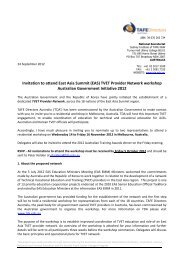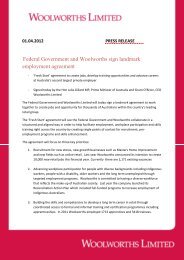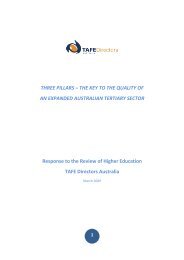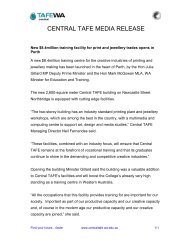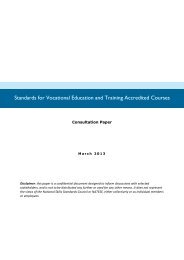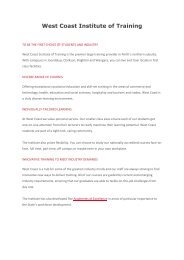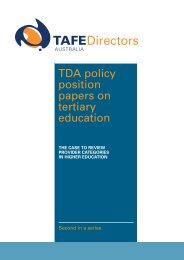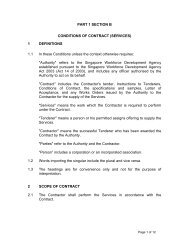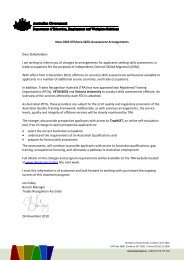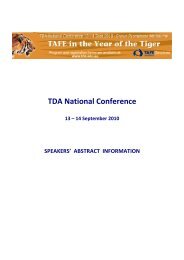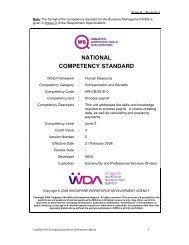Occasional Paper - TAFE Directors Australia
Occasional Paper - TAFE Directors Australia
Occasional Paper - TAFE Directors Australia
Create successful ePaper yourself
Turn your PDF publications into a flip-book with our unique Google optimized e-Paper software.
22<br />
<strong>TAFE</strong> IN THE YEAR OF THE TIGER<br />
2. learner satisfaction – measuring learner<br />
engagement, perceptions of the quality of training<br />
and resources available and the support they receive<br />
3. employer satisfaction – measuring employer<br />
perceptions of learner competency, relevance to<br />
work and further training, and the overall quality of<br />
training.<br />
From July 2010 reporting against the three KPIs<br />
become mandatory. However, the performance of<br />
individual VET providers is not publicly available.<br />
As part of the 2010–11 Budget, the <strong>Australia</strong>n<br />
Government announced that it would establish<br />
a MySkills website, an online database to inform<br />
students or potential students of their VET options<br />
to help them find the provider that best meets their<br />
needs. It will also allow students to make more<br />
informed choices about how to strengthen their<br />
skills base and will link with other sites such as the<br />
MyUni website. In the longer term, it is expected<br />
that with the inclusion of student outcome data, the<br />
site should also achieve improvements in the quality<br />
of training by showing providers where they excel<br />
and where improvements can be made<br />
(DEEWR 2010).<br />
While MySkills will publish valuable data, it will be<br />
limited to information relating to RTOs that receive<br />
public funding for accredited training delivery. The<br />
scope of public information on MySkills should be<br />
available for all VET providers, particularly since<br />
<strong>Australia</strong>n providers operate under a national<br />
infrastructure. Perhaps then VET providers would be<br />
held accountable for their actions.<br />
Greater transparency of outcome information will<br />
not only enable students and employers to make<br />
informed choices of provider, the evidence is that it<br />
positively impacts on provider behaviour. In England<br />
where the publication of qualification course<br />
and success rates is mandatory, the percentage<br />
of students completing whole courses has gone<br />
up from 50% to 75% in the last few years (Skills<br />
<strong>Australia</strong> 2010).<br />
Summary<br />
While the <strong>Australia</strong>n VET system has some<br />
exemplary providers and prominent amongst<br />
these are some <strong>TAFE</strong> institutes, more can be done<br />
to increase the overall quality of VET. There are<br />
undoubtedly some excellent practices being applied<br />
but without nationally consistent regulation, clear<br />
assessment practices, and better accountability, the<br />
overall quality of the VET system will continue to<br />
remain unclear. In my opinion, <strong>TAFE</strong> institutes should<br />
be more proactive in the pursuit for change – one<br />
simple way would be to get on the front foot and<br />
voluntarily publish individual provider information.<br />
This would go a long way to confirm a growing<br />
public confidence in the system.<br />
References<br />
<strong>Australia</strong>n Quality Training Framework (AQTF) 2007, AQTF essential<br />
standards for registration,<br />
www.training.com.au/.<br />
Department of Education, Employment and Workplace Relations (DEEWR)<br />
2010, www.deewr.gov.au/Department/Budget/Documents/<br />
FactSheet10BudgetMySkills-JS.pdf.<br />
Hoeckel, K, Field, S, Justesen, TR & Kim, M 2008, Learning for jobs: OECD<br />
reviews of vocational education and training, <strong>Australia</strong>, November,<br />
www.oecd.org/dataoecd/27/11/41631383.pdf.<br />
National Quality Council (NQC) 2008, Investigation into industry<br />
expectations of vocational education and training assessment:<br />
final report, June, www.training.com.au/documents/NQC_VET_<br />
Assessment_Report.pdf.<br />
National Quality Council (NQC) 2009, Quality assessment practices,<br />
Stage 1 report, www.nqc.tvetaustralia.com.au/nqc_publications.<br />
Skills <strong>Australia</strong> 2010, Forging a vision for <strong>Australia</strong>n vocational education<br />
and training: a discussion paper on the future of the VET system,<br />
Canberra, ACT.<br />
TVET n.d., ‘NQC quality of assessment action group’, www.nqc.tvetaustralia.<br />
com.au/about_nqc/action_groups/quality_of_assessment.




